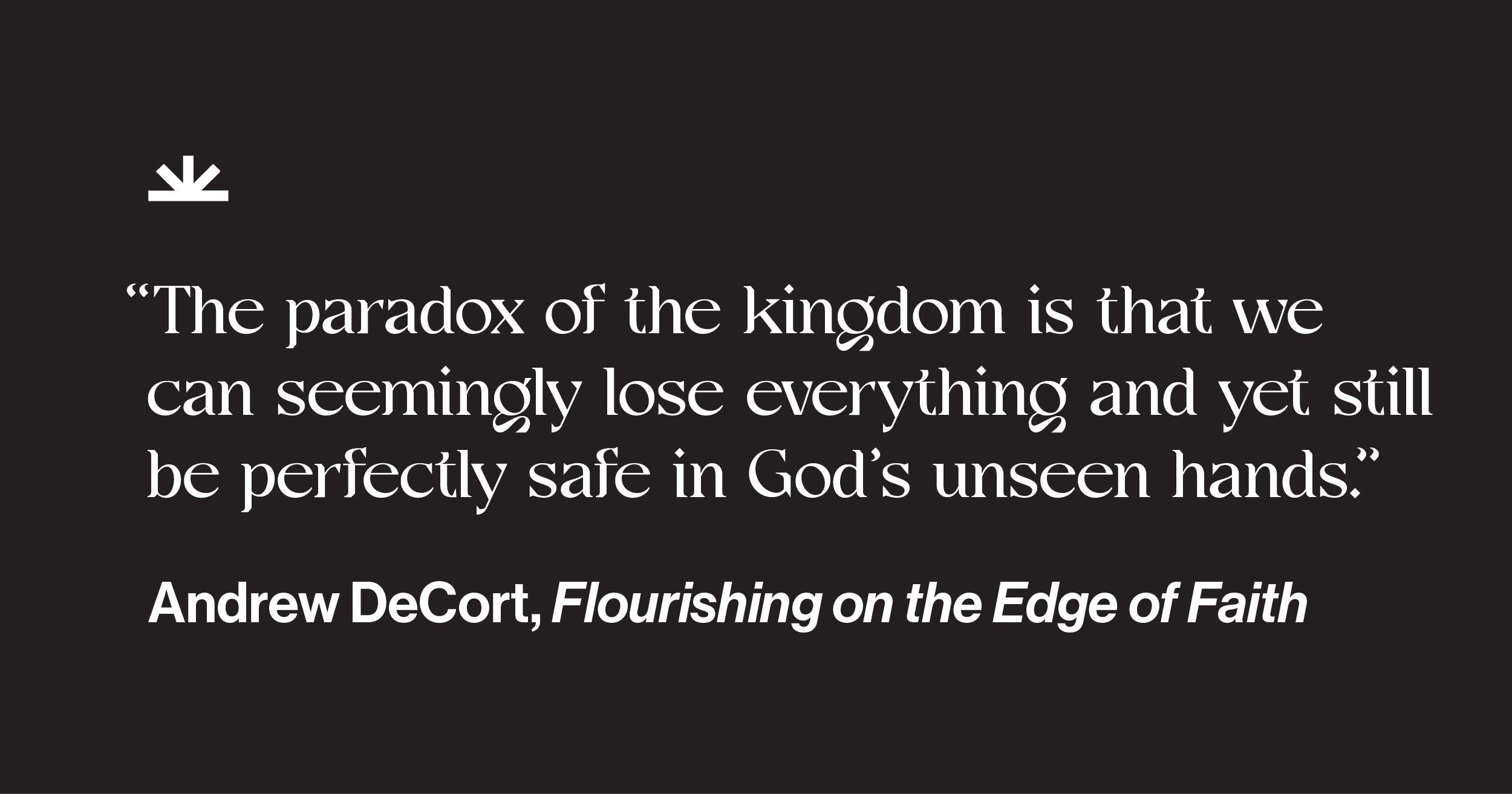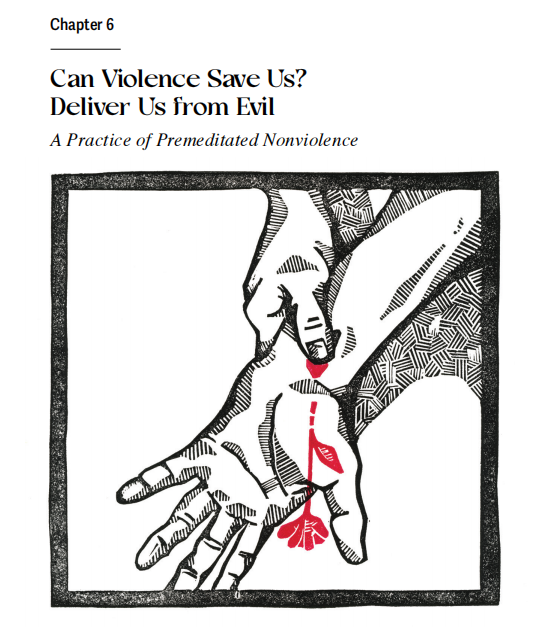Dear friends,
Yesterday marked the beginning of Holy Week. This is the sacred and sobering time when we remember Jesus’s arrest, crucifixion, and burial two thousand years ago.
As you meditate on the meaning of this week, I’m sharing an excerpt from chapter six of Flourishing on the Edge of Faith. It reflects on how Jesus responded to these extremely painful events at the end of his earthly life.
What I observe is that Jesus intensified his practice of opening his consciousness to God through prayer. As he did this, he courageously embraced what may be the most challenging paradox of faith in God’s nonviolent kingdom:

Perhaps there is stress building in your life at this time or you feel like something is coming to an end. May I invite you to pause this week and pray with Jesus the prayer that he taught us? This is not a magic charm or a quick fix. It’s a choice to open our consciousness to God and God’s promise of deliverance.
Our Father in Heaven,
Hallowed be your name.
Your kingdom come, your will be done, on earth as it is in heaven.
Give us today our daily bread,
And forgive us for our sins as we forgive those who sin against us.
Don’t lead us into temptation but deliver us from evil.
For yours is the kingdom and the power and the glory forever
Amen
Yours with prayer in Holy Week,
Andrew
The Most Defiantly Beautiful Death in History

Original artwork by Holly Harris
Despite the chaos of violence, Jesus’s premeditation prevails. He is centered and composed throughout the most anguishing hours of his life. We witness a person possessed of defiant freedom and healing creativity when only aggressive reactivity and powerless suffering seem possible.
When Judas steps forward to betray him, Jesus addresses Judas as friend. He meets his most intimate enemy with disarming dignity and resists soothing his own distress by using escalating insults (Matthew 26:50).
When Jesus’s disciples draw their weapons to defeat violence with violence, Jesus cries out, “No more violence! Put your sword back in its place! For all who draw the sword will die by the sword!” (Luke 22:51; Matthew 26:52-56). As Dr. King learned from Jesus, “Nonviolence is a weapon fabricated of love. It is a sword that heals.” Jesus remains lucid and resolute. Salvation by violence is an addictive illusion that can only kill us.
When Peter hacks off Malchus’s ear, Jesus reaches out and touches him. Jesus doesn’t take pleasure in Malchus’s pain or declare that justice has been served. Jesus uses his power to heal his enemy and restore his capacity to listen.
And when Jesus gets interrogated by the religious leaders and punched in the face, Jesus challenges them with facts and questions. He says that his movement was always public and nonviolent, so why arrest him at night with an armed militia? He protests their violence without crumbling or copying it, saying, “If I said something wrong, point it out. But if I spoke the truth, why are you abusing me?” (John 18:23).
Here we pick up where we left off in chapter 3.
Jesus finally stands before the Governor of Jerusalem under the charge of “subverting the nation.” Pilate interrogates Jesus for treason, and Jesus impenitently answers that he has a rival kingdom. But this kingdom operates without violence, and that’s why he stopped his followers from fighting for him. The real kingdom can only be defended by truth and listening, the pillars of peaceful deliberative process. And so Jesus asks Pilate questions and engages him in dialogue (Luke 23:2 and John 18:33-37).
Pilate hardens himself and asks, “Don’t you realize that I have power either to free you or to crucify you?” It’s as if Pilate is confused and exasperated by Jesus’s defiant dignity. This young carpenter is a decision away from being tortured and executed; and yet he doesn’t cower or beg for mercy. He remains unafraid and unrepentant, like an equal to his oppressor but claiming a higher power.
What happens next is one of the most psychologically profound scenes in human history.
Jesus is tortured and then slowly asphyxiated on a Roman cross. Religious leaders, government officials, and rebel fighters all unite in tempting Jesus with the same slogan: “Save yourself!” Ironically, these bitter enemies aligned around a common enemy and a shared ideology: salvation comes through violence.
In fact, the crowd humiliates Jesus with cutting language from his own prayer: “Let God deliver him now if he wants him.” These shaming words viciously attacked the core of Jesus’s spirituality – his own divine belovedness. They insist that pain and powerlessness are irrefutable proof of being unwanted and abandoned by God (Luke 23:35-39; Matthew 27:43).
But Jesus’s premeditation prevails once more. He isn’t overpowered by doubt, rage, and aggression. Instead, he invokes the presence of our Father and continues his spiritual practice amidst his pain.
Jesus dies the most beautifully defiant death in history.
We watch Jesus cry out with forgiveness for his killers. He prays, “Father, forgive them, for they don’t know what they’re doing.” Jesus recognized that these people were unpremeditated. They were off balance and out of control, dealing with their distress by mirroring the violence that oppressed them. So Jesus doesn’t damn them to hell; he asks God to give them a new beginning (Luke 23:34).
Jesus then promises the kingdom to the rebel being crucified beside him. Execution was designed to isolate and end victims – to erase their future and hope. But Jesus rebels against this nihilism. He assures his fellow criminal of their safe connection with God and unbreakable hope beyond suffering in the kingdom of heaven: “Today you will be with me in paradise” (Luke 23:40-43).
Finally, Jesus lets go and confesses his grief-filled trust in God: “Father, into your hands I commit my spirit.” His final breath protests against the taunt that our suffering proves we’re unwanted by God. Jesus disbelieves the voice of shame and trusts in the Voice of divine belovedness that birthed his movement.
Death is not the end. It’s a new beginning of being held by God’s hands and ushered into the kingdom of heaven (Luke 23:46; Matthew 27:46-50; Mark 15:34-37).
*** Excerpted from Andrew DeCort, Flourishing on the Edge of Faith: Seven Practices for a New We (Washington, DC: BitterSweetBooks, 2022), 125-127. Available at BitterSweetBooks, Audible, Kindle,Barnes & Noble, and all major booksellers.



